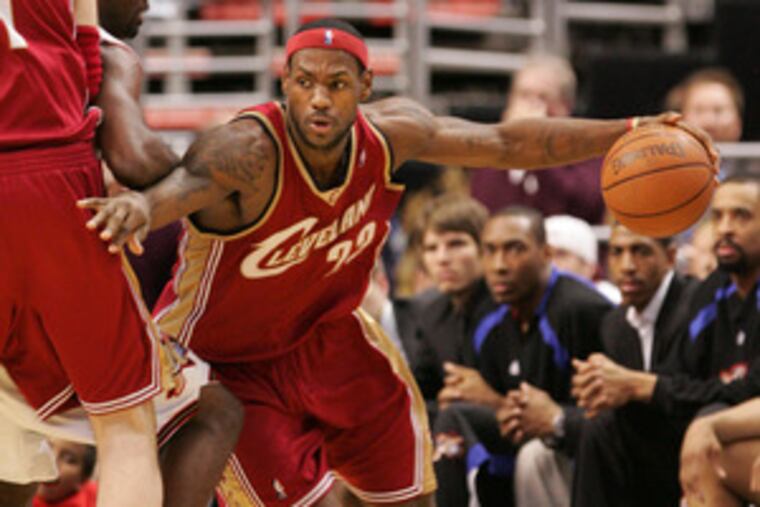On the NBA | Adjustments necessary: Playoffs a new ball game
Last year, Cleveland Cavaliers coach Mike Brown recalled, he wasn't surprising too many opponents with his offensive system. "Last year, I talked 90 percent of the time [about] defense," Brown said last week. "Offensively, I just put the ball in LeBron's hands . . . I said, 'LeBron, you bring it up the floor, you initiate the play, and you make the play with the bucket or the assist.' "

Last year, Cleveland Cavaliers coach Mike Brown recalled, he wasn't surprising too many opponents with his offensive system.
"Last year, I talked 90 percent of the time [about] defense," Brown said last week. "Offensively, I just put the ball in LeBron's hands . . . I said, 'LeBron, you bring it up the floor, you initiate the play, and you make the play with the bucket or the assist.' "
Brown left the offense up to LeBron James partly out of necessity; Larry Hughes missed most of last season after fracturing his hand. But Brown was also learning on the go. While his defensive credentials were well established as an assistant under Gregg Popovich in San Antonio and Rick Carlisle in Indiana, he hadn't spent a lot of time on the other side of the court.
"This is my fourth year coaching defense," Brown said, "because when I was at Indiana, Rick Carlisle gave me the entire scheme, the whole nine yards. This is my first year of coaching offense. So I'm learning the game, period. Last year, I didn't put a system in. This year, we have a system in that I'm happy with."
By putting the ball in Hughes' hands at point guard and inserting Sasha Pavlovic at shooting guard, Brown transformed Cleveland's offense the second half of the season.
Such changes are an everyday part of an NBA coach's life. Every night, a coach has to adjust to the opponent, the schedule, the officials and his own team's various whims and peccadilloes.
With the onset of the playoffs, which begin this weekend, making adjustments on the fly becomes even more accelerated, occurring not only from game to game but from quarter to quarter. Seeing the same opponent up to seven times in two weeks means that what worked for you in Game 1 will likely be rendered moot by Game 3.
And it's not just coaches that have to adjust. Players have to change, for the playoff game is called much differently by officials than your garden variety regular-season tilt.
"I think they let a little bit more go in the playoffs," Bulls center Ben Wallace said. "You're facing a guy three, four times. All the little tricks, all the little flopping and all that stuff doesn't work in the playoffs. The officials let you play through it."
Chicago gave Wallace $64 million last summer precisely because of his experience at this time of the year.
The Bulls haven't had anyone who could deal with Shaquille O'Neal, whose Miami Heat eliminated the Bulls last year. But Wallace has faced O'Neal in three straight postseason series, dating back to when Wallace's Detroit Pistons upset O'Neal's Lakers in the 2004 Finals. And Wallace's team has won two out of three.
The defending champion Heat have had to scramble since Dwyane Wade's shoulder injury. But in losing Wade, Miami may have found its traditional voice - stopping the opposition.
"Over the last 20 games, our defense, if you were to rank our defense, in the categories that we really emphasize, we would have the best defense in the league," Heat coach Pat Riley said. "Our defensive rebounding is not what it was last year, and that concerns me."
The Wizards would love to have such problems.
After being one of the league's feel-good stories the first half of the season, Washington has fallen apart down the stretch after losing its top two scorers and emotional leaders, all-stars Gilbert Arenas and Caron Butler, in one freakish 72-hour period late last month.
That's meant a complete overhaul of Washington's shoot-first philosophy, developed over the last two seasons, in just two weeks. And it means that Wizards forward Jarvis Hayes, in his first-ever playoff series, gets to check James.
"We still have things that still work," Wizards coach Eddie Jordan said Friday. "It's just different ways. Most importantly, what we've done is stay away from [taking] quick shots, like Gil would take, Caron would take in the open floor. Like Antawn [Jamison] would do. We're taking those away, probably 65, 70 percent of them."
Slowing the ball down is the only way the Lakers have a chance against the Suns. Los Angeles almost pulled off an upset of Phoenix last year in the first round by executing its triangle offense to near perfection. Kobe Bryant trusted his teammates to make the open shot, and for six games, they did. But the Lakers wilted in Game 7 on the road.
This season, the Lakers aren't nearly as precise offensively. They also will have to face a healthy Amare Stoudemire, who missed last year's postseason while recovering from knee surgery. And Stoudemire told reporters in Phoenix last week that he didn't think playing the Lakers would be much of a problem.
How do the Lakers respond?
That's the mystery and challenge of the postseason.